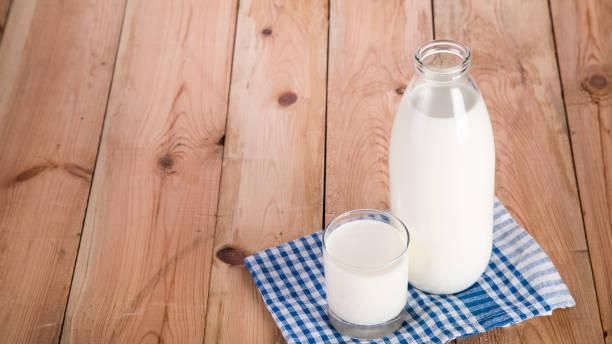Soymilk benefits on health include lowering the risk of cholesterol, cancer, and obesity. It helps in improving cardiovascular health and reducing the risk of many postmenopausal problems. High-quality protein and vitamin content of soymilk makes it a beneficial supplement for a plant-based diet.
Best Sources of Protein That You Must Eat(Opens in a new browser tab)
Soybeans are a legume from which many food items are made for regular diet consumption. [1] Soy products replace many meat dishes and are popular with those eating a vegetarian or vegan diet because of the high protein content. Soymilk and other soy products are traditional staples of Asian cuisine. Soymilk can also be used to make tofu which is a cheese substitute. Use of soymilk is said to have begun in China in A. D. 82. It is used extensively in other Asian countries such as Japan and Malaysia. Today, it is used all over the world and is easily available in various varieties across many countries.
Soymilk is extracted from the soybean. Many choose soymilk because of its versatility and ability to be used as a milk replacement in recipes. It is a good source of protein for those who are lactose intolerant. It is available in chocolate and vanilla flavors. In countries such as China and India, some people also drink salted soymilk.
With the cost-effectiveness of soy and its increasing popularity in diets around the world, research studies are beginning to look at the other health benefits of this natural plant product.
Soymilk Nutrition Facts
Unfortified soymilk, original or vanilla, is a good source of energy, protein, sugar, dietary fiber and fat. Amongst minerals, it contains calcium, iron, magnesium, phosphorus, potassium, sodium, and zinc. Various vitamins such as folate, thiamin, riboflavin, niacin, vitamin B6, vitamin B 12, vitamin D, vitamin E, and vitamin K are also found in soymilk. It also contains saturated, monounsaturated, and polyunsaturated fatty acids. All these nutrients help in maintaining good health. [2]
The nutritional value of soymilk may vary as to whether or not it is fortified. Though the protein content in soymilk is comparable to that of cows1, other nutrients may be of less content, and fortification of vitamins and minerals is a common practice in commercially produced soymilk products.1 Fortified soymilk is a nutritious milk substitute for those eating a plant-based diet or with dairy allergies since it contains calcium and other vitamins. The protein content and isoflavones present in soymilk, both fortified and unfortified, are phytonutrients; have many preventive medicine benefits. The nutritional value of soymilk products may vary as per brands.
Soymilk Benefits
soymilk benefits on health includes the following:
Prevents Cancer
According to a research study, intake of soymilk may reduce serum estrogen levels and reduce the risk of breast cancer. Breast cancer is common amongst women and levels of estrogen is associated with this type of cancer. Especially, post-menopausal women are at a higher risk for breast cancer and often consume soy products such as soymilk for other health benefits of estrogenic replacement. Results of a research study also suggest that men with high consumption of soymilk are at lower risk of prostate cancer. [6] [7]
Provides Relief from Osteoporosis
Soymilk is beneficial in providing relief from osteoporosis in postmenopausal women. [4] Osteoporosis is a risk for women in post-menopausal years of age.1 Often known as brittle bones, loss of calcium contributes to the risk of developing this disease.1
Studies have found that an animal protein diet increases urinary excretion of calcium and a soy-based protein diet does not.1 Since increasingly soymilk is also fortified with calcium, it could be said that soymilk helps in retaining and providing supplements to the body. [5] 1 Natural hormone replacement therapy with soy isoflavones may improve retention of bone mass and density, and thereby reduce the risk of fracture in postmenopausal women.2
Controls Obesity & Lowers Cholesterol
Intake of soymilk, rich in isoflavones, helps lower metabolic obesity in men as well as post-menopausal women.2 Apart from this, it helps in reducing waist circumference amongst obese and overweight individuals. The hormonal effects of soy isoflavones work to inhibit adipogenesis resulting in reduced enlargement of adipose tissue.2 Those who consume soy isoflavones may not only benefit from the adipogenic effect but also the LDL-cholesterol lowering effects that help treat and prevent heart diseases.2
Improves Heart Health
Soymilk contains protein which is essential for growth.1 Proteins are made of amino acids which are shown to have a beneficial effect in preventing various health disorders. The amino acid and isoflavones content of soy protein also help lower LDL-cholesterol.1 Other studies have shown that consumption of soy isoflavones reduces serum cholesterol levels in elderly men.1Amongst type 2 diabetic patients, soymilk intake is associated with normal blood pressure. Thus, intake of soymilk is an effective way of improving cardiovascular health. [3] 1
Acts as Antioxidant
The antioxidant effects of soy isoflavones may be beneficial against certain chronic diseases. Curdle soymilk or tofu has antioxidant and hepatoprotective properties, which help in reducing oxidative stress and damage. A study suggests that it may be beneficial in preventing liver damage caused by oxidative stress. Further, findings of another research study suggest that the antioxidant properties of soymilk may help in increasing antioxidant capacity and reducing menopausal symptoms in women. [8] [9]
Relieves Postmenopausal Issues
Soymilk provides relief from many postmenopausal health issues. Studies suggest that soy isoflavones may help in maintaining estrogen levels in the menopausal women. 2 Intake of soymilk by post-menopausal women may assist in preventing maladies that may occur due to the natural loss of estrogen hormone.2 The antioxidant effects of soy isoflavones may further be beneficial in the reduction of certain chronic diseases, especially that of the cardiovascular system.2







